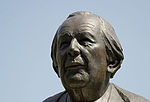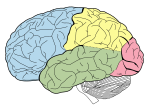The psychology of learning refers to theories and research on how individuals learn. There are many theories of learning. Some take on a more behaviorist...
37 KB (4,723 words) - 21:19, 6 March 2024
values of groups that they aspire to join Epistemology – Branch of philosophy concerning knowledge Implicit learning – in learning psychologyPages displaying...
79 KB (9,953 words) - 14:46, 3 July 2024
Educational psychology is the branch of psychology concerned with the scientific study of human learning. The study of learning processes, from both cognitive...
70 KB (8,910 words) - 21:39, 21 May 2024
(1996). "Cognition and learning". Handbook of Educational Psychology. 77: 15–46. Ackerman, Phillip L. (1 March 1996). "A theory of adult intellectual development:...
56 KB (6,249 words) - 09:25, 18 June 2024
learning pyramid (also known as “the cone of learning”, “the learning cone”, “the cone of retention”, “the pyramid of learning”, or “the pyramid of retention”)...
3 KB (303 words) - 08:29, 1 June 2024
knowledge. Hermann Ebbinghaus first described the learning curve in 1885 in the field of the psychology of learning, although the name did not come into use until...
36 KB (4,346 words) - 17:10, 16 June 2024
Implicit learning is the learning of complex information in an unintentional manner, without awareness of what has been learned. According to Frensch and...
28 KB (3,673 words) - 09:47, 13 August 2023
Geographical learning theory focuses on the ways that contexts and environments shape the learning process. Outside the realm of educational psychology, techniques...
53 KB (6,664 words) - 18:10, 17 May 2024
In cognitive psychology, chunking is a process by which small individual pieces of a set of information are bound together to create a meaningful whole...
47 KB (6,096 words) - 20:02, 19 June 2024
Behaviorism (redirect from Behavioural psychology)
Are Theories of Learning Necessary? in which he criticizes what he viewed to be theoretical weaknesses then common in the study of psychology. An important...
88 KB (10,419 words) - 17:13, 4 April 2024
some colleges, educational psychology courses are called "the psychology of learning and teaching". Educational psychology derives a great deal from basic-science...
44 KB (5,438 words) - 00:40, 16 May 2024
Learning through play is a term used in education and psychology to describe how a child can learn to make sense of the world around them. Through play...
43 KB (5,282 words) - 00:21, 16 June 2024
Memory (redirect from Memory (psychology))
associations in normal and amnesic subjects" (PDF). Journal of Experimental Psychology: Learning, Memory, and Cognition. 11 (3): 501–18. doi:10.1037/0278-7393...
128 KB (16,049 words) - 08:08, 13 June 2024
Psychology is the scientific study of mind and behavior. Its subject matter includes the behavior of humans and nonhumans, both conscious and unconscious...
235 KB (26,524 words) - 04:22, 23 June 2024
Developmental psychology is the scientific study of how and why humans grow, change, and adapt across the course of their lives. Originally concerned...
135 KB (16,532 words) - 01:37, 3 June 2024
Psychology 390: Psychology of Learning. University of Idaho. Archived from the original (PDF) on 6 April 2012. Skinner BF (1938). The behavior of organisms...
24 KB (2,958 words) - 06:58, 10 April 2024
Déjà vu (redirect from Déjà entendu (psychology))
0963-7214.2004.00320.x. S2CID 23576173. Ross, Brian H. (2010). The psychology of learning and motivation. Vol. 53. London: Academic. pp. 33–62. ISBN 9780123809063...
36 KB (4,309 words) - 14:51, 28 June 2024
PMID 32765332. Karwowski, M (June 2018). "The Flow of Learning". Europe's Journal of Psychology. 14 (2): 291–295. doi:10.5964/ejop.v14i2.1660. PMC 6016036...
90 KB (10,607 words) - 02:39, 2 July 2024
educational psychology, anthropology, and applied linguistics. Over the past decade, LS researchers have expanded their focus to include informal learning environments...
11 KB (1,409 words) - 03:01, 5 June 2024
Testing effect (redirect from Test-Enhanced Learning)
retrieval of prior learning. In his 1932 book Psychology of Study, C. A. Mace said: "On the matter of sheer repetitive drill there is another principle of the...
63 KB (6,873 words) - 14:54, 19 June 2024
E-learning theory describes the cognitive science principles of effective multimedia learning using electronic educational technology. Beginning with...
39 KB (5,243 words) - 16:53, 11 January 2024
cognition, learning, motivation, emotion; developmental processes, social psychology, and the neural substrates of all of these. Experimental psychology emerged...
51 KB (6,564 words) - 10:04, 27 February 2024
Pseudoword (category Psychology of learning)
to examine speech recognition. and in experimental psychology, especially the psychology of learning and memory. Nonsense syllables were first introduced...
13 KB (1,629 words) - 18:35, 4 June 2024
In psychology and cognitive science, a schema (pl.: schemata or schemas) describes a pattern of thought or behavior that organizes categories of information...
34 KB (4,286 words) - 15:12, 23 April 2024
In psychology and ethology, imprinting is any kind of phase-sensitive learning (learning occurring at a particular age or a particular life stage) that...
18 KB (2,273 words) - 07:55, 2 May 2024
theory, developed by Clark Hull in 1943, is a major theory of motivation in the behaviorist learning theory tradition. "Drive" is defined as motivation that...
9 KB (1,115 words) - 16:37, 12 August 2023
Spaced repetition (redirect from List of spaced repetition software)
of her grandchild five days later. The notion that spaced repetition could be used for improving learning was first proposed in the book Psychology of...
29 KB (3,530 words) - 02:05, 13 May 2024
Edward Thorndike (category Members of the United States National Academy of Sciences)
comparative psychology and the learning process led to the theory of connectionism and helped lay the scientific foundation for educational psychology. He also...
46 KB (4,708 words) - 20:49, 23 June 2024
of concept learning diverge on all these basic points. The history of psychology has seen the rise and fall of many theories about concept learning....
33 KB (4,177 words) - 12:41, 1 April 2024
Critical psychology – Perspective on psychology Educational psychology – Branch of psychology concerned with the scientific study of human learning Enactivism –...
20 KB (2,390 words) - 14:35, 8 April 2024










